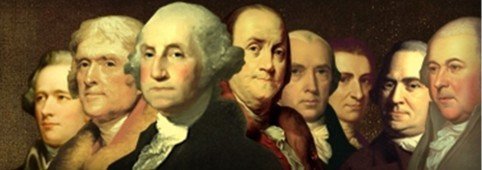
The term republicanism, according to the classical definition, refers to the political philosophy that advocates representative democracy. In the 19th century, it was illegal to openly advocate republicanism in France, so French advocates of representative democracy began calling themselves "radicals." In the mid-19th century, the term radical republican came into general usage in Britain, France, and America, referring to advocates of representative democracy who pushed for universal suffrage.
During the American Civil War, there were Moderate Republicans, like Abraham Lincoln, who wanted to abolish slavery but did not want equal rights for African Americans. Abraham Lincoln wrote:
"I will say then, that I am not nor never have been in favor of bringing about in any way, the social and political equality of the white and black races; that I am not nor never have been in favor of making voters of the free negroes, or jurors, or qualifying them to hold office, or having them to marry with white people. I will say in addition, that there is a physical difference between the white and black races, which, I suppose, will forever forbid the two races living together upon terms of social and political equality, and inasmuch as they cannot so live, that while they do remain together, there must be the position of superior and inferior, that I as much as any other white man am in favor of the superior position being assigned to the white man."―Abraham Lincoln (Fifth Debate with Senator Douglas [Oct 7, 1858])
The term Radical Republican was used in reference to people like Charles Sumner, Thaddeus Stevens, Ulysses S. Grant, Daniel Phillips Upham, and John Creswell, who wanted the former-slaves to be granted citizenship and voting rights. They also wanted government jobs to be given to freed African Americans, as well as reparations and free education. The Radical Republicans basically advocated full civil rights and equality for African Americans. Unfortunately, the Moderate Republicans won control and their white supremacist ideology remained the dominant force for another century. The Radical Republicans also went after the KKK and wanted to prohibit anyone who had been loyal to the Confederacy from holding any political office. It was the Radical Republican Ulysses S. Grant who ended Indian removal and appointed the first Native American commissioner of Indian Affairs.
Louis Blanc (1811-1882), a republican socialist, was instrumental in developing the radical republican idea in France. He advocated reforming the system through democratic means and reorganizing industry by creating worker-controlled cooperatives to replace capitalistic industry. In the 1890s, Léon Bourgeois revived and updated French radical republicanism along social democratic lines. He promoted cooperative solidarism, progressive taxation, and welfare programs on a social insurance basis. The social democrats, like Eduard Bernstein and Annie Besant, who advocated "evolutionary socialism" or "fabian socialism" were also radical republicans. They supported representative democracy and proposed the use of democratic means in order to bring about a more socialistic (cooperative) organization of industry.
Then there are the American founding fathers that could be looked at as radical republicans of sorts. In the original draft of The Declaration of Independence, Thomas Jefferson justified the American rebellion against the British on the grounds that the King of England allowed the immoral institution of slavery to carry on in British colonies. The American Revolution, as far as Jefferson was concerned, should have had abolishing slavery as one of its primary goals. Jefferson also advocated progressive taxation and widespread distribution of property-ownership. (Cf. Thomas Jefferson, To James Madison [October 28, 1785]) Benjamin Franklin advocated profit-sharing business partnerships that were designed to ultimately make workers into owners. (Cf. Autobiography of Benjamin Franklin) Thomas Paine advocated collecting a ground-rent (or land value tax) and using the revenue therefrom to provide everyone with a citizen's dividend or universal basic income. Paine thought that all citizens should receive a basic income starting at the age of 21, and an additional social security payment on top of that starting at the age of 50. (Cf. Thomas Paine, Agrarian Justice) In many ways, the ideas of Jefferson, Franklin, and Paine are reminiscent of social democracy and radical republicanism.
While I advocate representative democracy, I advocate a more radical form of it. I believe that political candidates should be chosen by sortition (lottery), thereby eliminating career politicians. The voters should then choose their representative from these randomly selected candidates. I also advocate delegative democracy, where delegates are recallable. Representatives should be subject to removal and replacement at any time for any reason. If the voters feel that their representative is acting erratically or unethically, they should be able to easily remove and replace their representative. In addition to this, I believe that local politics should be more participatory, and that government should follow a policy of subsidiarity, so that government is done more locally. Furthermore, I think that digital direct democracy should be used as a check on legislative power, allowing the people to directly veto laws passed by their representatives. And I hold that decision-making should be done more deliberately and on a more consensus-oriented basis. I think that representatives, whether in municipal councils or in the national congress, should have to openly discuss and debate the pros and cons of proposed rules and policies and then make a decision via a qualified consensus process. My emphasis on delegative, deliberative, and participatory democracy is due to the influence of Pierre-Joseph Proudhon, Mikhail Bakunin, Peter Kropotkin, and Murray Bookchin. I agree with certain aspects of their libertarian municipalist doctrine, although I reject the idea of pure free association and consensus as being unrealistic and impractical. Thus, I am not an anarchist but a libertarian republican.
Ultimately, I advocate a radical form of republicanism that I classify as libertarian social democracy. Libertarian social democracy is deeply rooted in the ideas of the American founding fathers, as well as in the broader radical republican tradition, which advocated universal suffrage, universal education, social welfare, civil rights, distributive justice, and a movement towards a more cooperative economy.